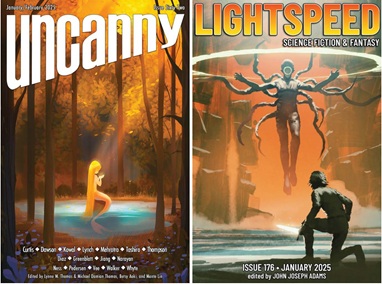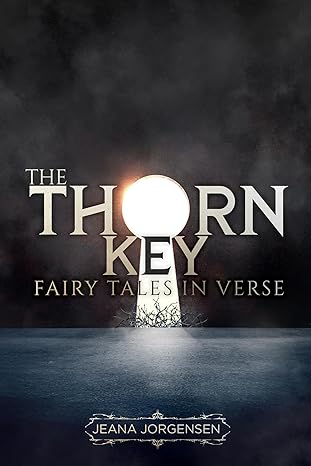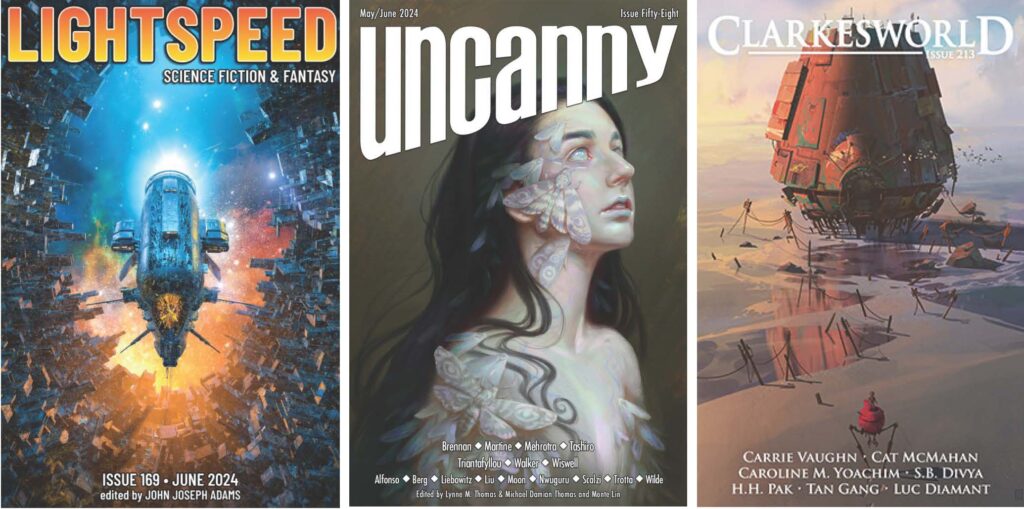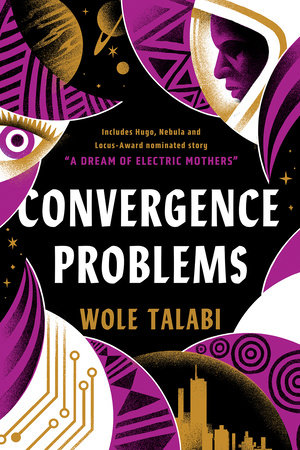Short Fiction Review: January/February 2025

“My favorite stories from January and February look at conformity, assimilation, diversity, and connection from various angles.”
Poetry Book Review: The Thorn Key, by Jeana Jorgensen

It’s not a long collection, containing about 40 poems (some just a few lines, many several e-pages long), a foreword, a list of content warnings/triggers, a fascinating multi-page afterword, and an appendix that lists which fairy tales inspired which poems. I don’t necessarily recommend trying to read all the poems in one go, since that may blunt their edges and impacts, but rather reading a few per day, taking time to savor them.
Short Fiction Review: June 2024

My favorite stories from June feature characters who are struggling to find answers or closure and who are interrogating the narratives that reinforce power. In “In the Hands of the Mountain God” by Deborah L. Davitt (published in Lightspeed Magazine), a woman reckons with the problem of evil, risking her own life to get demand answers from a god. “Three Faces of a Beheading” by Arkady Martine (published in Uncanny Magazine) is a smart and surprising story about the power of narratives, both those published in history books and those we watch/play out in games. “Himalia” by Carrie Vaughn (published in Clarkesworld Magazine) is set on a lunar outpost that’s about to be abandoned, a beautiful, detailed setting for a story about moving forward even when closure is hard to find. “In the Hands of the Mountain God” by Deborah L. Davitt After a plague kills Sennu’s family and people, she finds herself at a monastery of Eero the mountain god. Eero isn’t even one of Sennu’s people’s gods, but it seems her gods have died. Eero, at least, “was a god. He might have answers for her. An answer for the terrible whys that burned in her heart and soul.” So Sennu, brimming with grief and rage, struggling against despair, prepares for a dangerous pilgrimage to meet Eero and hopefully wrest some answers out of him. This is a story, in short, about the problem of evil: about why awful things happen to good people, about grappling with these “terrible whys” and trying to find some way to move forward. It’s a meaningful and relatable story. Crucially for a story like this, the ending is strong. The problem of evil doesn’t have easy answers, so it would be easy for a story like this be feel unsatisfying, whether because it doesn’t offer any insights or it offers poor ones. Instead, the story leans into the character of Sennu — her strength and her desire — and offers a believable, moving, and satisfying conclusion. If you appreciate stories that incorporate religion, or if the problem of evil keeps you up at night, check this one out! “Three Faces of a Beheading” by Arkady Martine “Three Faces of a Beheading” has three main threads. First, there’s the present day, in which “you” watch and participate in “mass-story games,” which are kind of like live streamed virtual reality role-playing games. An anonymous player piloting “the Soldier” makes a bold — and dangerous — political statement about the empire/regime you live under, which both inspires and unnerves you. This portion of the story feels like a near-future world, one that’s novel and weird yet deeply relatable and arguably already here. For example, I particularly enjoyed this line: You’ve played the Soldier. Everyone tries it, once or twice. (Everyone who gets into mass-story games, at least. There’s people out there whose lives are very boring and don’t contain narrative experiences at all. You’ve met them at work.) Second, there’s a history: the story of a failed revolt against the empire, the story which informs the mass-story game you’re watching/playing. This pairs well with the third thread: a detour into an academic mode (complete with footnotes), reflecting on historiographies, narratives, power, and politics. For example: A historiography presents a view of events-which-happened which is acceptable or understandable to the larger culture-complex, even when that view is meant as an intervention into the current state of affairs—a historiography which means to rehabilitate a ‘bad’ emperor, for instance, is still engaged in normative narrative-making, as it uses the values which already exist in the culture to make new claims about events which have occurred in the past. The academic discourse is admittedly dense, but as a nerd for these sorts of things, I enjoyed it! However, it’s the shortest part of a fairly short story and history of the revolt is easier to follow. Together, these threads remind readers that the histories we tell are contingent things — the historical narratives we weave don’t just serve power but can be rewritten to question and challenge power as well. The present-day thread extends that to the stories we play out in video games and around the tables of role-playing games. These narrative experiences are inextricably political — and therefore powerful and important. “Three Faces of a Beheading” is a marvelous story about history — not just what happened in the past but importantly how we form narratives and create meaning from the past and how those narratives wield power. This is a fun, opinionated, and surprising story, one that’s both playful and weighty, and I highly recommend it, especially to fans of video games, role-playing games, history, or academia. “Himalia” by Carrie Vaughn Jenny grew up on Himalia, a small moon of Jupiter. Her family is part of a mining co-op that set up a temporary base on the moon, one that’s lasted for decades. Jenny left years ago to find her own way in the system, but now she’s returned to visit because the base is closing down and soon to be abandoned. It’s her chance to reconnect with family and friends and say goodbye to the place she grew up in. Importantly, it’s Jenny’s chance to make amends with and support her childhood bestie Niri, who was never able to bring herself to leave Himalia before and who even now may not be ready to abandon her home. Similar to The Expanse, this story takes place in a universe where humans have colonized the solar system, with outposts on different planets and moons. It’s futuristic, but believably so, imaginably so, and this story pays fine attention to the details of it. Vaughn does a tremendous job immersing you in the setting, making the moon feel inhabited and the story feel real. Here’s an example: Going from artificial light to open space, I needed a moment to take stock. The filter darkened my visor, but I squinted anyway, reflexively. The rule was to look at your
Short Fiction Review: February 2024

My favorite story from February was “Why Don’t We Just Kill the Kid In the Omelas Hole” by Isabel J. Kim … My other favorite stories from February all took the form of in-world artifacts of some sort.
Book Review: CONVERGENCE PROBLEMS by Wole Talabi

“… (E)ven the most widely read out there will find something new here, and something of significance.”
Short Fiction Review: January 2024

My favorite stories from January all wrestled with tough ethical questions [“A Saint Between the Teeth” by Sloane Leong, “Nothing of Value” by Aimee Ogden, and “A Cure for Solastalgia” by E.M. Linden].

